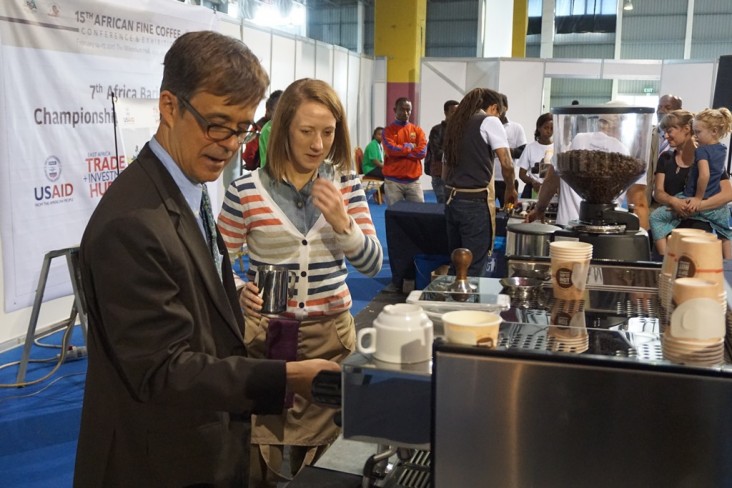
(As prepared for delivery)
Your Excellency President Mulatu Teshome, Your presence here today is testament to how important the work of the African Fine Coffees Association is for Ethiopia, as well as for the continent as a whole.
It is truly my pleasure to have the chance to address such a distinguished group of coffee roasters, traders, producers, buyers and connoisseurs.
Since the year 2000, when AFCA was founded, world coffee consumption has grown massively (from 113 million 60kg bags to 151 million 60kg bags). For those of us who love coffee, this growth is not surprising. Coffee means friendship. We meet over coffee. We welcome guests with coffee—with Ethiopia’s coffee ceremony probably one of the best examples. Personal and business relationships often begin over cups of coffee. And, for the one-third of the world’s population which now drinks coffee every day—coffee is an essential prerequisite for the start of the work day.
The demand for coffee is likely to continue growing with the interconnectivity of markets and the sharing of cultures. Don’t tell the tea people, but coffee is even becoming much more popular in places like China, South Korea and Japan. In fact, Starbucks now has more than 2,100 stores in over 100 cities and towns across China. This growth in coffee consumption presents a tremendous opportunity for coffee producing countries.
But the increase in consumption is only one side of the equation. As consumers become more sophisticated, the demand for high-quality coffee is also increasing. Even at highway rest stops in the United States—people are no longer happy with just any coffee—they demand good coffee.
The theme of this year’s exhibition is “Reshaping the African Coffee Industry for Productivity and Investment.” This topic is so important because many African coffee growers are still smallholder farmers who have been growing coffee the same way for decades. These growers now find themselves in competition with vast coffee plantations in Latin America and Asia which have grown in both size and in the application of technology and can better take advantage of economies of scale. To compete, actors in the African coffee sector must not only adjust their production techniques to address things like climate change and crop disease—they must also be able to successfully navigate costly global logistics chains and customs processes, meet increasingly stringent quality standards, and hedge in foreign exchange markets.
To enhance productivity at each step in the coffee value chain, substantial investments and wise compromises from all stakeholders are required. National governments need to work with smallholder farmers and agribusinesses to help them ensure that their coffees meet international quality standards. Many producers will need to adopt new varieties and change their cultivation and processing systems to take advantage of where the market is heading. At the same time, transportation companies, exporters, and roasters may need to adjust their operations to ensure that the way they process and handle coffee meets quality and safety standards and is priced competitively. But, these are all investments and compromises which will pay off.
To help in these areas, the United States is working with our African partners to help drive enhancements in areas like production and resource management techniques, value chain linkages, access to finance, and policy reform.
Specifically, the U.S. Government’s Feed the Future initiative is working with African governments and business communities to improve coffee varieties, production techniques, packaging, distribution, marketing, and financing in order to ensure that the sector can help lift more people out of poverty and provide better futures for their children.
USAID’s East African Trade and Investment Hub collaborates with governments and businesses to promote coffee investments and exports. The hub works with businesses so they can participate under the aegis of the African Growth and Opportunity Act, which encourages commercial exports to the United States.
Here in Ethiopia, Feed the Future has been working in the coffee sector for the past five years and is committed to continuing its efforts. And, I am pleased to announce that the U.S. Government is about to launch a new project to strengthen market linkages and investment opportunities in six value chains including coffee, as well as maize, chickpea, livestock, dairy and poultry. The new activity will support Ethiopia’s Agricultural Growth Plan. The premise of the new activity is that by improving productivity and market linkages, smallholder farmers and growers will increase their incomes and nutritional options.
This work is similar to what ACFA is trying to achieve. By improving investment potential, your members invest in small-scale crop production in a way that makes the entire African coffee industry more competitive. Those investments, if done well, will increase incomes and provide families with the means to improve their own health and prosperity. The United States wholeheartedly supports that effort. We look forward to partnering with you, as you strive to keep pace with global developments and seize new opportunities.







Comment
Make a general inquiry or suggest an improvement.